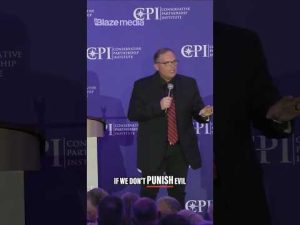In recent news, President Biden has made headlines for a massive wave of pardons, reportedly granting clemency to an astonishing 9,000 individuals. This number far exceeds those granted by former Presidents George W. Bush, who gave only 500 over eight years, and Jimmy Carter, who issued 12,000 pardons during his time in office. Biden’s action has sparked considerable debate, especially since a portion of these pardons appear to include some truly peculiar cases that have left many scratching their heads.
One standout case involves a woman from Dixon, Illinois, who was once in charge of town finances. It turns out she had been transferring a whopping $54 million into her own bank account, which raised quite a few eyebrows. It seems this small-town financial whiz didn’t just stick to a modest lifestyle. Oh no! Instead, she went on an extravagant shopping spree, purchasing 400 horses (yes, 400!), 48 trucks, luxury motorhomes, classic cars, boats, 80 acres of land, and some pretty shiny jewelry. While one might assume that such spending would raise a red flag, it apparently took a vacation and a look at the bank records for her town to catch on to the shenanigans. After serving a few years of her 20-year sentence, she was placed under house arrest, and guess who stepped in to grant her freedom? Yes, President Biden.
Now, the question that many are asking is: what on earth prompted these pardons? There’s a certain element of mystery behind the decision-making process. Individuals with connections might send a whisper to the right person, suggesting that a certain individual deserves a second chance. But given the sheer volume of 9,000 pardons, the practical realities are that the President likely does not have the time or the resources to personally vet every case. This raises eyebrows about justice and the fairness of the system. After all, shouldn’t cases be scrutinized more thoroughly, especially when they involved large sums of public money or egregious sentencing practices?
Take, for example, a judge accused of unethical behavior that involved funneling juveniles into a for-profit prison system. This case, which caused significant outrage among the public, highlights serious concerns about corruption and the exploitation of vulnerable individuals. In such troubling instances, the idea of early release seems unjust. There’s a palpable frustration among citizens who feel that certain individuals should serve their entire sentences, especially those who have manipulated the justice system for personal gain.
And speaking of manipulation, the news cycle recently reminded everyone of a wrongful accusation against the Duke lacrosse team. Long after a mistrial was declared due to discrepancies in the case, one of the accusers, now serving time for murder, came forward claiming to have fabricated the story. This narrative raises ethical questions about accountability and justice and how some individuals appear to escape the consequences of their actions. It’s no wonder many folks think that a blanket pardon system can lead to more chaos than cohesion when it comes to our legal system.
So, as President Biden’s pardoning spree continues to unfold, the nation watches closely. Questions loom about fairness, justice, and the potential for deeper systemic issues within our legal system. Will this mass pardon initiative result in justice being served, or will it further muddy the waters? One thing is for sure: with 9,000 individuals being granted clemency, there is bound to be both celebration and controversy in the coming days. Buckle up, America; the pardoning rollercoaster has only just begun!



